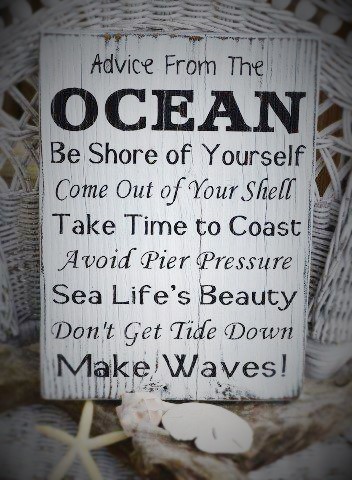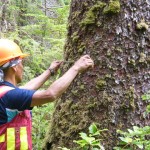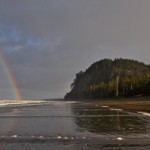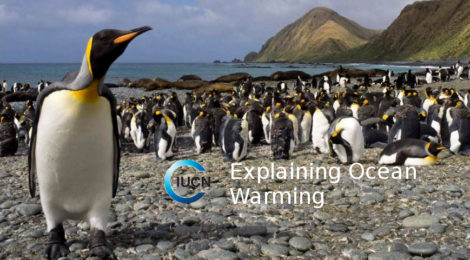
Ocean Warming For And By The Politically Correct
Just Published Are Hundreds Of Pages Of A Scholarly Summation On The Crisis Of Ocean Warming
This racehorse report designed by a committee of nearly 100 dutiful scientists is filled with marvelous and horrifying detail and politically climate change dutiful commentary
What these authors have neglected or at most rendered subservient to climate physics is the role of biological part of the ocean, you know all of ocean life from microscopic plankton to blue whales, which the authors portray as mere victims of ocean warming, not in ocean life’s principal role as being what has and always will control the temperature of their blue planet.
As expected the solutions called for by the IUCN is a new global government that empowers their kind over the vast majority of this blue planet. They do say we know what to do and it is time to get on with it, that’s very true.
Here’s some commented material to help guide you through this epic tome, and the very real and proven solution to get on with.
By International Union for Conservation of Nature, comments in red by Russ George
A new 400+ page International Union for Conservation of Nature (IUCN) iucn ocean warming report, explaining ocean warming: causes, scale, effects and consequences, sets out the most recent and comprehensive review to date on this topic and documents a complex story of change in the ocean. This change is underway, often already locked in for many decades to come and has already begun to impact people’s lives.
This is no longer a single story of ocean warming challenges to coral reefs, but a rapidly growing list of alarming changes across species at ecosystem scales and across geographies spanning the entire world. It is pervasive change, driven by ocean warming and other stressors already operating in ways we are only beginning to understand, where essential gaps in marine data, systems and capabilities are leaving the world poorly prepared to cope in the future.
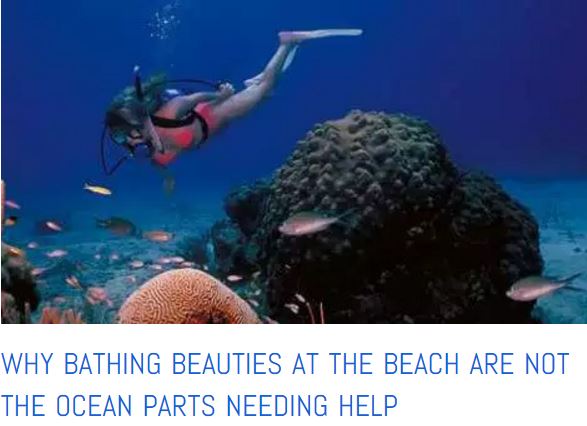
The ocean crisis due to humanities high and rising CO2 is so much more than bathing beauties at the beach, click to read more
Thank the ocean gods that this reports departs from the endless media spin about the plight of the oceans being a story about the coral reefs, those bathing beauties at the beach which have been the nearly exclusive media star when it comes to stories about the plight of the oceans suffering under the burden of humanities CO2, aka global warming, enough already it’s the larger ocean that is in peril and for which we have practical affordable solutions to help at hand.
Ocean warming may well turn out to be the greatest hidden challenge of our generation. More than 93 percent of the enhanced heating since the 1970s resulting from human activities has been absorbed by the ocean and data show a sustained and accelerating upward trend in ocean warming. The scale of ocean warming depicted in the report is truly staggering: If the same amount of heat that has gone into the top 2 km of the ocean between 1955 and 2010 had instead gone into the lower 10 km of the atmosphere, the Earth would have seen a warming of 36 C.
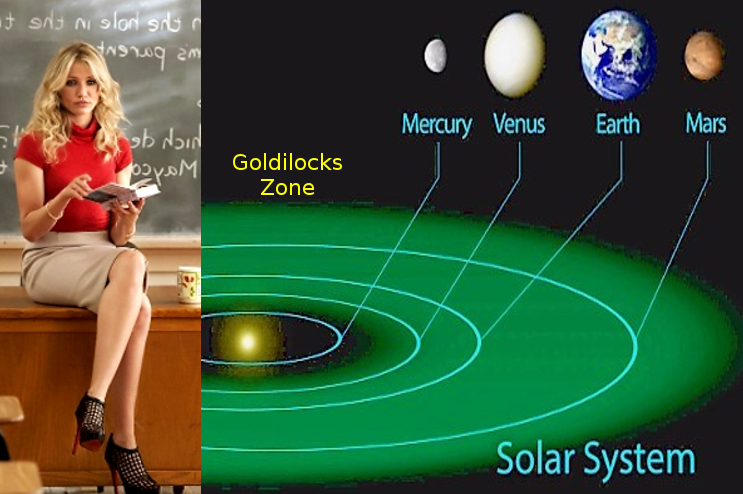
This Blue Planet’s ocean life are the greatest power on Earth, they control the temperature of oceans and keep us in the Goldilocks Zone – click to read more
The ocean manages heat on this blue planet with two orders of magnitude greater influence than how CO2 adds heat to the atmosphere! Details in this report. So why do we look to atmospheric physics and mitigation notions in that realm? Where humanity should be focusing its attention on our high and rising CO2 is the vast vital oceans of this blue planet. Clearly any mitigation tool applied to the atmospheric side of the equation requires a 100 fold greater potency, aka cost, than mitigation performed within the oceans.
Compiled for IUCN by 80 scientists in 12 countries, the report explores the impacts of ocean warming on ecosystems and species and on the every-day benefits derived from the ocean—its “goods and services” known as ‘ecosystem services.’ That’s Mother Nature to you and I.
Major changes caused by ocean warming and other stressors described in the report include impacts on entire ecosystems from polar to tropical regions, predicted to increase further in scale, stretching from accessible coasts to the deep ocean seabed; entire groups of species such as plankton, jellyfish, fish, turtles and seabirds being driven by up to 10 degrees of latitude towards the Earth’s poles to keep within reasonable environmental conditions; loss of breeding grounds for groups such as turtles and seabirds, and impacts on the breeding success of birds and sea mammals; and seasonality shifts by plankton, leading to potential mismatch between plankton species with fish and other marine wildlife.
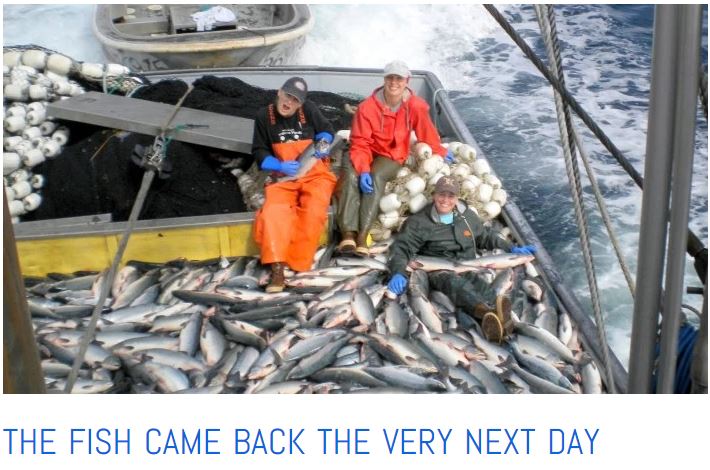
The most potent and positive thing we humans can do on behalf of the oceans and ourselves is to restore ocean pastures as I have done proving that with $72,000 worth of rock dust we can rock the ocean world and bring back the fish and all of ocean life to historic health and abundance – click to read more
This is dutiful attribution to global warming of the dire impacts on ocean life which the report focuses as being about displacement as opposed to eradication of ocean life, while some fraction of ocean plankton, seabirds, fish, etc. are being displaced a far larger fraction of that same ocean life is being eradicated in place.
The proven solution to saving ocean life from death is to restore and sustain ocean pastures, the phytoplankton that lies at the bottom of the ocean food and life chain. The effectivness and incredibly low annual cost of restoring ocean pastures is equal to a tiny fraction of the funding to study ocean warming that is provided annually to the scientific efforts that sustained this report.
We now know that the changes in the ocean are happening between 1.5 and 5 times faster than those on land. Such range shifts are potentially irreversible, with great impacts on ecosystems. What this will result in, decades down the line, is less clear. It is an experiment where, rather than being a casual observer in the lab, we have unwittingly placed ourselves inside the test-tube.
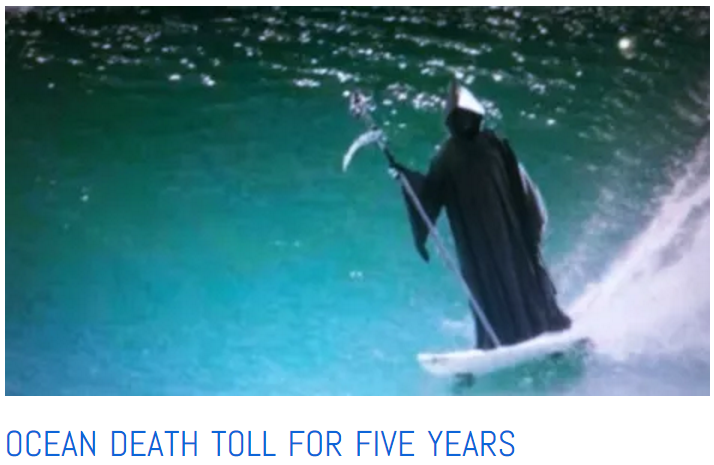
CLICK TO READ MORE IF YOU DARE
This is the author’s way of stating that humanities high and rising CO2 has resulted in the direct effect as they show is seen in ocean warming and the plethora of dire consequences that is producing. They then mince words by stating that it is somehow a ‘question’ as to what this will result in “decades down the line” ignoring the staggering calamity of a great ocean dying that is clearly upon us today.
The report also describes the inadequacy of current knowledge, capabilities and capacity to adequately study ocean warming and to advise and cope with the associated challenges. The global community is increasingly committing itself to a high-carbon future which it is poorly equipped to understand, let alone cope with. The impacts are already outstripping what is fully understood and the capacity of the global community to act.
This section of the report makes an unabashed pitch for more research dollars, the ever-present principal action favoured above all else in fields of academic science and bureaucracy.
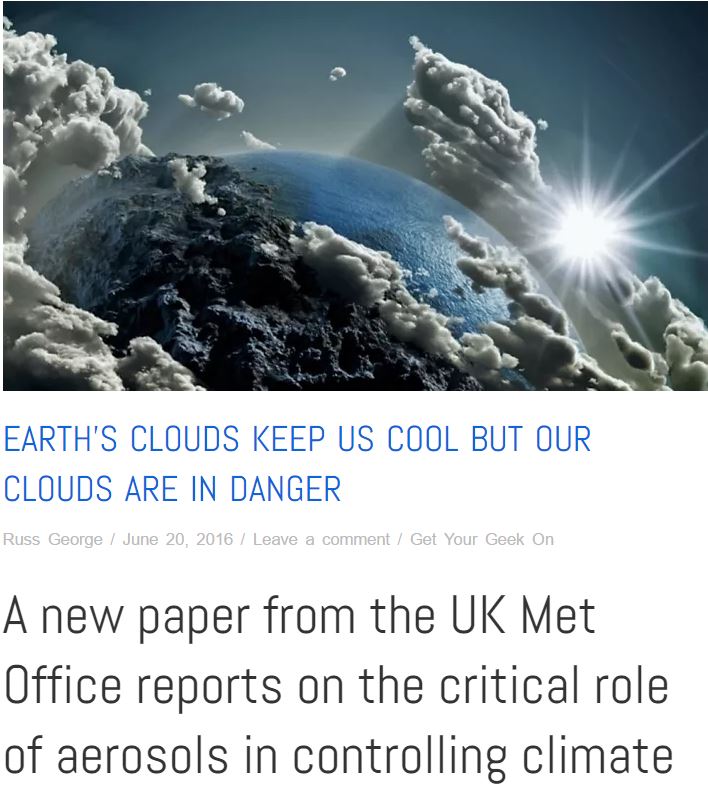
The world’s cooling and rain producing clouds are for the most part created by ocean plankton – click to read more
The world, perhaps distracted by the bustle of daily issues on land, has been ignoring the impact climate change has been having on the largest living space on the planet—the ocean. The ocean lies at the heart of the climate system and it must now lie at the heart of climate discussions. Through the implementation of the Paris agreement under the United Nations Framework Convention on Climate Change, parties should now consider ocean impacts in the so-called “nationally determined contributions” (NDCs) outlining national best efforts towards a sustainable low-carbon future. It is now critical to address atmospheric CO2—the root cause of these and so many other problems—and achieve rapid and significant reductions of what we emit.
Here here, the report and I agree in full the very real crisis this blue planet faces is the critical role of humanities high and rising CO2 which clearly causes all manner of chaos in terms of climate change but is in fact wreaking 100 times the havoc in our oceans.

The Paris COP21 Accord is done with a target to restrain global warming to 2° C. The entirely voluntary accord in short expects the world to reduce CO2 emissions by ~30% by the year 2050, sooner the better. The International Energy Agency says getting on with it will cost $16.5 trillion between now and 2030 alone! – click to read more
The report was launched at the IUCN World Conservation Congress, a key moment to press home the urgency with which such reductions now need to be achieved. We should reflect that we are locking in a worrying warming trend in the ocean, the only ocean we have, on the only world we know, teeming with life. Now is the moment to be wise and act.
Future generations will then no doubt thank us for the wisdom of our deeds. In the end, it is perhaps poetic to return to the words of Edward Young: “Be wise today; ’tis madness to defer.”
Stay tuned to this blog as we will report on many of the tremendous insights offered in this magnificent report even though it misses the most important point that being as we restore our ocean pastures to former health and abundance they will in turn restore our entire blue planet.
Most important take-away from this is the fact that taking action to deliver proven sustainable ocean ‘ecosystem services’ to restore ocean pastures we can help Mother Nature help all. And for a tiny fraction of the cost of working outside of the ocean on ‘global warming’.
